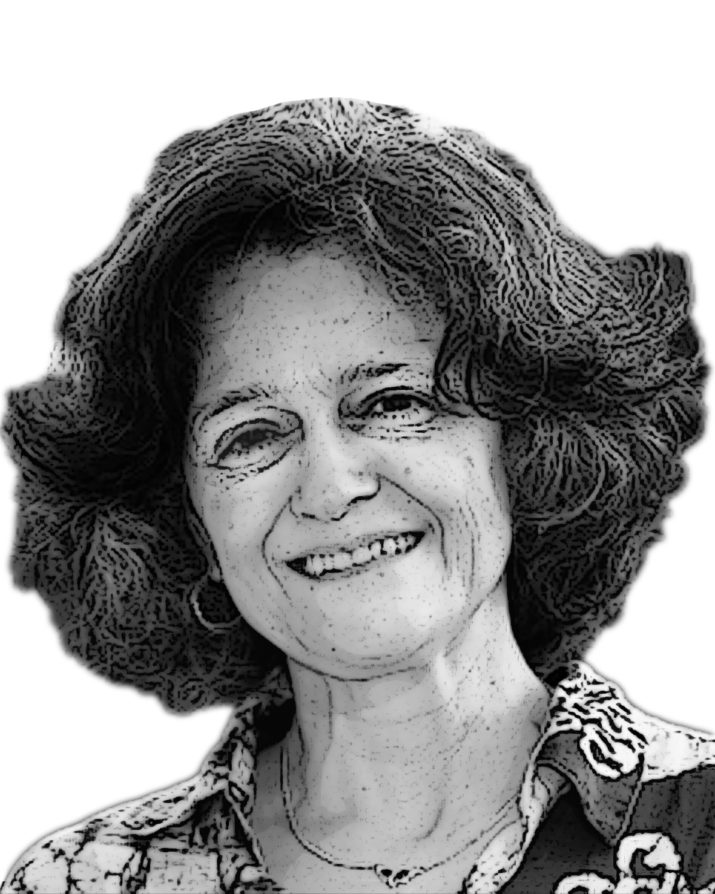

Bahiyyih Nakhjavani is the author of three novels set in the nineteenth century. The first two novels share a fabulist, allegorical quality: The Saddlebag (2000) takes place along the pilgrimage road between Medina and Mecca in what is now Saudi Arabia, while Paper (2004) features a Persian scribe in search of the perfect writing surface. The Woman Who Read Too Much was published in 2015 and fictionalizes the revolutionary real-life figure of Táhirih, a Persian poet and scholar who rejected the veil and threatened society with her literacy.
Nakhjavani’s most recent novel is her first set in contemporary times, and was my introduction to her writing. Us&Them was published this spring by Stanford University Press (and as Eux&Nous by Actes Sud in France). At the book’s center is a trio of women, all displaced in one sense or another by Iran’s Islamic Revolution. Daughter Lili pursues an activist, academic life in Paris, while her sister Goli raises a family in “Tehrangeles,” California. Their mutual desire to extract their aging mother from her Iranian home conflicts with their equally fervent desire to keep her at a distance, leading to a kind of maternal time-sharing arrangement that has Bibijan shuttling back and forth across the Atlantic. This female triangle gets ample support, mockery, judgment, and gossip from the circle of fellow expats and immigrants that surrounds them, so Us&Them can cast its satirical gaze widely, on family relationships, modern Persian mores and manners, and the politics of international migration. Few novels are as deft at balancing the issues of the day with the traditional pleasures of fiction.
Nakhjavani agreed to answer some questions about Us&Them. Once we began corresponding, though, the thread of our conversation led us to many other books.
—James Crossley for EuropeNow
EuropeNow Today we have Instagram to provide us with misleadingly narrow, envy-inducing glimpses at other people’s lives, but when I was younger there was only the book jacket. There you’d find a moody photo of the author accompanied by a teasing bio: Arthur McAuthor divides his time between a modern Manhattan penthouse and a sixteenth century farm on the Normandy coast. The back flap copy for your new novel is reminiscent of this tradition, but I suspect there’s a good deal of all-too-real life to be read between those lines. Can you elaborate a little about your background?
Bahiyyih Nakhjavani I wish I were more interestingly “moody” in the photo; it strikes me as manically coy! But I assure you, no teasing was intended. The back flap only attempted to summarize what many “corridor people” like myself have experienced in life. Basically, the land in which I was born (Iran) was not the land where I grew up. The country in which I passed an idyllic childhood (Uganda) was not the place where I was finally educated. My boarding school (in rain sodden Wales) was as different as could be from the place I ultimately completed my studies (vibrant leafed UMass, Amherst) and the library (at Smith College) where I wrote a doctoral thesis on peeping Toms in the erotic verse of the late sixteenth century is about as different as could be from sun-baked Cyprus where I raised my daughter, and poverty-stricken Sierra Leone where one of my brightest students at university died of cerebral malaria before my very eyes. There are millions of people currently drowning in the Mediterranean and crawling under barbed wire fences across the frontiers of Europe and elsewhere, who could tell far more interesting stories of where they began, where they went, and where they ended up. My story is dull by comparison. But we are all “corridor people” with a foot in several rooms and a belief in the world as our ultimate home. I found myself in France by accident some decades ago, and stayed, not for any exotic or romantic reasons, but for gratitude, because of a job and medical insurance! But it was precisely the fact of being at a loss for words in this culture that led me to write books. My citizenship is in the English language.
EuropeNow I love the opening pages of Us&Them. They address almost all the concerns a reader might have about what kind of novel it is, for one thing. It’s immediately apparent that this isn’t a safe piece of historical fiction about a vanished fairy-tale land called Persia, and neither is it an agenda-driven polemic about an oppressive fundamentalist terror state called Iran–it’s much more complicated than that, and much more fun. Did you write the first chapter first, or did it come later once you’d established the tone of the rest of the book? And how was it that you decided to use a collective narrator?
Bahiyyih Nakhjavani The first chapter that sounded the notes of that collective voice of “we,” was actually “The Association.” I didn’t decide to use a collective narrator; it literally came to me and I thought, oh, how interesting. Who’s this? Soon after I wrote a very early version of “Apocalypse” and then “Conference,” which brought in more threads of complexity and hinted at a back-story, and then suddenly I realized the floodgates had opened. There were a thousand and one tales to tell, each of which echoed the same narrative voice but evoked a different “we.” And that was when “we” began to wonder what the hell “we” were doing; “we” began to ask ourselves who “we” were and what kind of book, if any, “we” thought “we” were writing. Ergo, the first chapter. And that was when I understood that this “we” was not the Royal We; it was not the Editorial We either. It was the Persian “We,, the word used all the time by Iranians. This specifically Iranian “we” has associations across a wide spectrum–all the way from sincere humility, to false modesty, to a slightly sycophantic hypocrisy, and finally to the edges of self-serving irresponsibility. Once I realized that my collective narrator was so utterly Persian, the rest was easy.
The story of Bibi and her daughters had already been percolating for some time and I just wasn’t sure where to take it, so I had it rolled up in a corner, waiting to see if it was worth pursuing. When the voice of the collective narrator came through, I realized this reversed King Lear story, this tale of a mother, her two daughters and her lost son, combined the narrative of “them” with the cameo chapters of “we.”
EuropeNow One of the great strengths of the book is its delicacy, the nuanced way you depict subtle behavioral differences. In the “In-Laws” chapter, for example, your narrator oh-so-politely exposes the character flaws of both the Eastern and Western branches of the family, all to fairly devastating effect. Is this kind of close observation simply your gift as a writer, or is there a cultural precedent for it?
Bahiyyih Nakhjavani You are very complimentary. I honestly don’t know how to answer the “gift as a writer” question, except to say that when one is particularly close and simultaneously cut off from a subject, as I am in relation to Iranian culture, one develops a curious love/hate relationship towards it. One observes it, perhaps, with a little more detachment, precisely because its pull is so strong, so engulfing. I needed to use satire for that reason–to observe the Iranian psyche at arm’s length in order to understand some part of myself. But for that reason, too, the satire had to be inclusive, compassionate, forgiving. It couldn’t be ruthless or cutting or cruel, driven by Swiftian anger or Rothian revenge (!). Although I have been somewhat alienated from Iranian culture by geography, education, language, and time, I am linked to it, nevertheless, by family and history, and a sort of subcutaneous loyalty.
Also, though one cannot hope to emulate such masters, I was trained in the school of Shakespeare. How can one not learn from him, that the heart breaks “smilingly?”
EuropeNow Much has been said in recent years, both good and ill, about the “Global Novel.” Allegedly, such fiction has international focus and wide appeal (hurray!), but it is also elitist and homogenizing (boo!). Do you see your work fitting anywhere in this context?
Bahiyyih Nakhjavani So many of these labels are invented, I think, simply to flag readers to generic bookshelves for the sake of sales, as well as to protect publishers from risk, for the same reason. We live in an age of brand names, identity tags, cultural politics; we need to box and label everything we read, wear, eat, and say according to code bars in this materialistic society. It is actually the reason I chose the title Us&Them and not Us & Them or even Us and Them–leave alone Us or Them or worst still, Us vs Them. I was aspiring to oneness, God help me, and if that is what the word “Global” means, in terms of international focus and wide appeal, why not—so long as it doesn’t provoke the reaction of Theresa May that a “world citizen is a citizen of nowhere” or suggest “globalization” in its most restrictive sense of elitism and homogenization. Certainly, it is a book that is not rooted to only one country or place. I couldn’t make it other than that; it spans the planet simply because Persians in the diaspora actually do! The story of the old woman begins in an airport, in transit, and ends in a graveyard, which marks the transitory nature of life.
I hoped this story would go beyond the Persian diaspora. It is about all migrant communities, all refugees, all people exiled either by choice or because of necessity. We do need labels, to flag the limits of our knowledge, the extent of our ignorance, but as Aminatta Forna says, labels can also limit who we are. She is a Sierra Leonian Scottish writer: does that make her black, white, British, African, global? Her response is that she doesn’t want to be tagged as anything, even feminist, and would rather just be a “writer.” I would add, and if possible a human being.
In one of Ursula Le Guin’s wonderful little short stories, she writes (from the point of view of a dead worker ant): “Tunnels are long. But the un-tunneled is longer.”
EuropeNow I kept thinking of Lore Segal while I read your book. Her fiction, like yours, treats themes of immigration, exile, and assimilation through comedy. Her writing, like yours, is feminist, sardonic, diasporic, and brilliant. This isn’t really a question, just a compliment. But why don’t I ask about your influences and antecedents while I’m at it? And about your favorite contemporary writers?
Bahiyyih Nakhjavani Again, thank you for the compliment; most undeserved.
I have the greatest admiration in the world for Marilynne Robinson and find depth of her compassion, the range of her reading, the lucidity and purity of her prose absolutely breath-taking. Somehow she has managed to write novels that are very American but very universal, because they are such eternal, human stories. I also love A.L. Kennedy’s sardonic Scottish voice, which hides pain so achingly well, as in her brilliant novel Day and the Irish, past and present, never fail to dazzle me–Colm Tóibín et al. José Saramago has left us but I found his Blindness terrifying and The Elephant’s Journey utterly hilarious, poignant, and sublime. I also loved Mohsin Hamid’s The Reluctant Fundamentalist and am very eager to read his latest Exit West, which I keep buying and giving away to others…
But I must say, I keep going back to the oldies–the cross-cultural ironies of Henry James and Nabokov, the exaggerated lunacies and terrors of Gogol and Dickens, the liquid flow of point of view mastered by Virginia Woolf. Recently, I discovered Pushkin and Proust (to be taken in short doses) and Dante’s Inferno and Purgatorio. So much to read …
Bahiyyih Nakhjavani is an Anglo-Iranian writer, novelist and essayist who currently lives in France. She received an honorary doctorate from the University of Liege in Belgium in 2007 for her fiction and non-fiction which has been translated into more than ten languages.
James Crossley is a bookseller who lives in Seattle. His writing has appeared in various publications that focus on international literature, including Full Stop, Three Percent, Book Riot, The Review of Contemporary Fiction, and NW Book Lovers.
Photo: Bahiyyih Nakhjavani, Private
Published on June 22, 2017.




